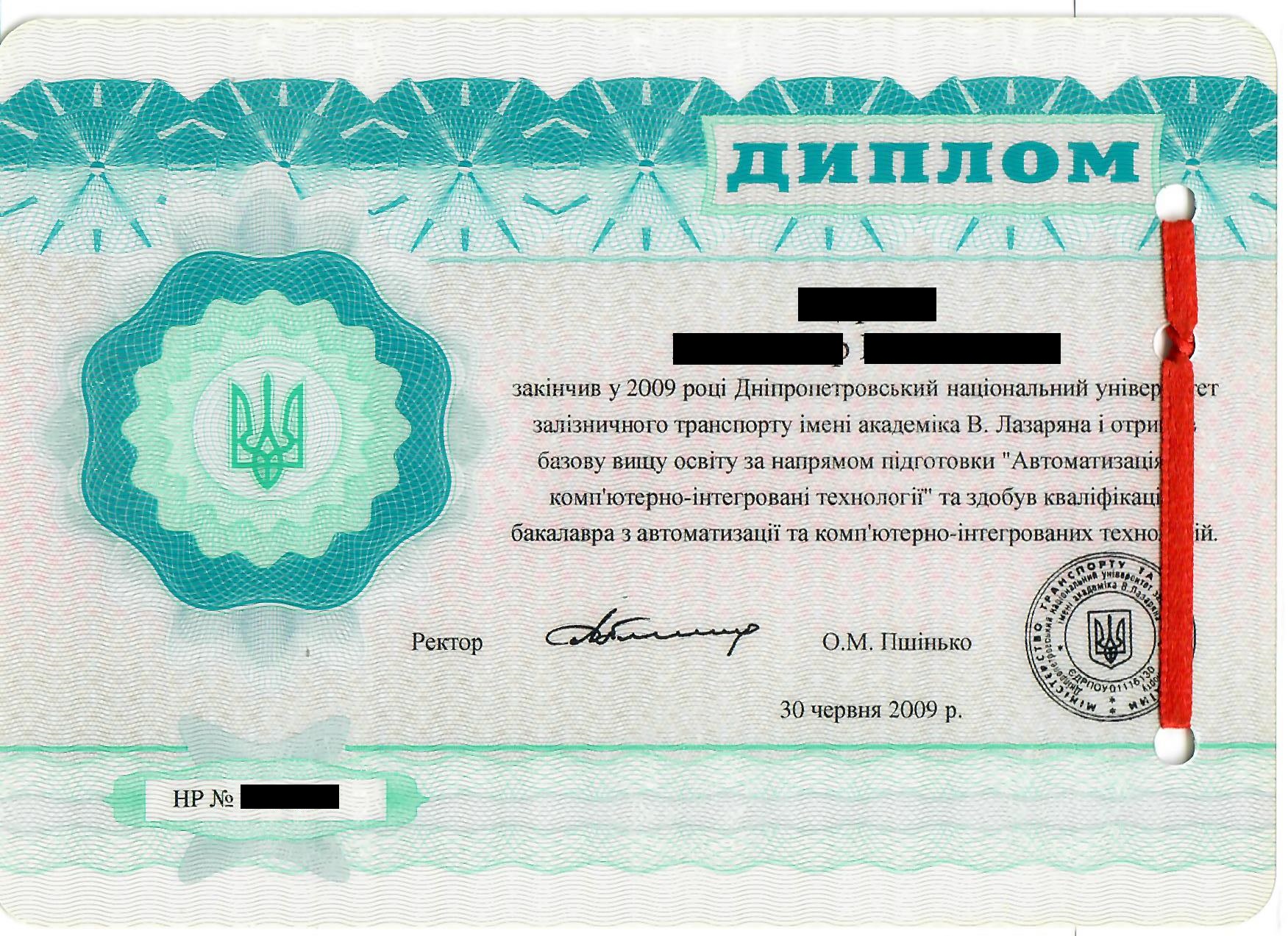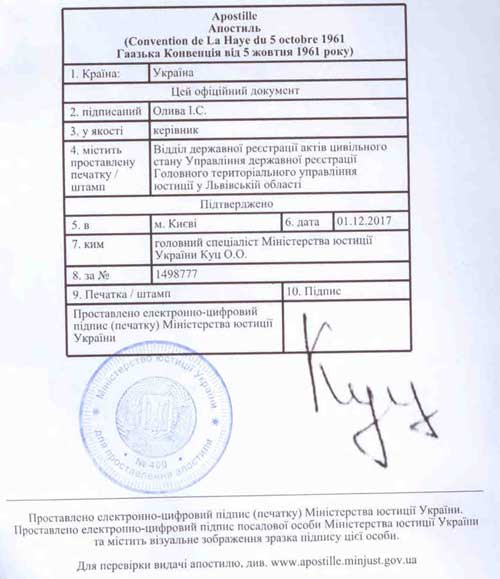
The recognition of educational documents issued in Ukraine is an important step for those who intend to use their qualifications in Europe and the United States. There are specific procedures such as apostille, legalization, and recognition that need to be carried out to ensure that Ukrainian diplomas are recognized in these regions.
Why and in which cases is an apostille required?
An apostille is a special stamp or certificate that confirms the authenticity of an official document. It can be affixed to documents issued by state institutions, local authorities, and other entities authorized by the government.
Commercial documents cannot be apostilled. Therefore, if you have received a certificate for an educational course from a private company without an educational license, it cannot be apostilled. The apostille process is applicable only to documents issued by certified educational institutions with an official state license.
The apostille confirms the fact of document issuance and the authenticity of the signature of an authorized official. However, it does not automatically grant access to specialized fields such as medicine or law. Furthermore, it does not replace the recognition of a higher education degree, which is typically conducted through the recognition process by the competent authorities in the destination country.
It is important to note that the apostille can only be affixed in the country where the document was issued. It is not possible to obtain an apostille through diplomatic or consular authorities.

When is an Apostille Not Required?
Most commercial organizations do not require the mandatory legalization of a diploma through apostille for positions that do not involve special access requirements. Additionally, an apostille is not necessary for diploma recognition if there is a special regime for the mutual recognition of diplomas and academic degrees between Ukraine and another country.
For example, Ukraine was a participant in the Minsk Convention of 1993, which means that an apostille was not required for diplomas in most CIS countries. It was sufficient to provide a notarized translation from Ukrainian to the official language of the country where the document would be used.
However, Ukraine officially withdrew from the Minsk Convention in February 2022, which means that an apostille is now required for Ukrainian diplomas in most CIS countries.
If the document will be used in Germany, we recommend contacting the receiving party to determine if an apostille is required for the Ukrainian diploma. German authorities generally show flexibility regarding the absence of an apostille on Ukrainian documents and may only require a notarized translation from Ukrainian to German.
Procedure for Applying an Apostille to Ukrainian Diplomas
The process of apostille application in Ukraine is similar to the procedure in Germany but slightly faster. The apostille is affixed by the regional branches of the Ukrainian Ministry of Education or the Ministry of Education and Science in Kyiv. The Ministry of Education sends a written request to the university that issued the diploma, and after receiving confirmation, the apostille is affixed.
Due to the political situation, it is not possible to affix an apostille to diplomas from Crimea, Donetsk, and Luhansk issued before 2014, as well as diplomas from universities in regions that joined the Russian Federation in 2022. The Ukrainian Ministry of Education physically cannot send a request to universities in these regions. In this case, it is necessary to obtain Russian diplomas and affix the apostille at the Ministry of Education of the Russian Federation.
The process of apostille application at the Ukrainian Ministry of Education usually takes about 5-10 working days and does not require a power of attorney.
Documents required for legalization:
- Original diploma
- Original supplement to the diploma, if available
Since 2000, diplomas in Ukraine have been issued in the form of plastic cards, usually without an appendix. The diploma is simply stamped, and the apostille is affixed.
Before 2000, Ukrainian diplomas included both the diploma itself and the appendix. In this case, two apostilles are affixed to the diploma and the appendix, and they are not stapled together.
The appearance of the apostille in Ukraine is standardized and does not depend on the place of affixation.

Document Shipping from Ukraine
Since the apostille is affixed to the original documents in Ukraine, it is necessary to send the document directly to Ukraine. The cost of this courier delivery is calculated based on the rates of courier services.
However, due to the current political situation, we do not recommend sending the original documents to Ukraine. There is a high risk of the document not reaching its destination.
In this case, we work with our colleagues in Kyiv to obtain a duplicate of the diploma from the university or school, affix the apostille in Kyiv, and transport the document to Germany first, and then deliver it to the client.
Due to existing restrictions, the shipping process takes 3-4 weeks.
Consular Legalization in Ukraine
If the diploma is intended to be used in a country that is not a party to the Hague Convention, such as the United Arab Emirates, or Egypt, such a document requires consular legalization. This is a more complex procedure than apostille. The process of consular legalization of diplomas in Ukraine involves several steps:
- Create a notarized copy of the diploma in Ukraine.
- Notarized translation of the copy into the language of the receiving country.
- Authentication at the Ministry of Justice of Ukraine.
- Authentication at the consular department of the Ukrainian Ministry of Foreign Affairs.
- Authentication at the embassy of the destination country.
The first three steps of legalization can be done at the regional level or in Kyiv.
However, the final step of authentication at the embassy cannot be done in Ukraine at the moment. Due to the political situation, practically all embassies in Ukraine are closed. You will need to contact the embassy of the destination country, which is located either in Warsaw or Berlin. An exception to this rule is the United Arab Emirates. After authentication at the Ukrainian Ministry of Foreign Affairs, you will need to directly approach the Ministry of Foreign Affairs of the UAE in Dubai, where the final legalization will take place.
Translation of an education documents
In order to use an education document abroad, after legalization it is necessary to make an official certified translation in the country of destination. If the translation is made by a certified translator in Ukraine, the official authorities will not accept it.
The translation of the document must necessarily go through a verification procedure. This is a process in which the prepared translation is sent to the graduate to verify the correct spelling of the first and last name, the disciplines studied and the topics of research papers, since there may be inaccuracies in the translation.
A certified translation can be laced with an apostilled notarized copy.
What's Next?
Once you have obtained a legalized diploma and a copy of it with a certified translation, the documents are officially considered usable.
Each country has its own procedures and criteria for recognition, which may include evaluation of the educational system, verification of the curriculum and learning outcomes, and assessment of the qualifications against national standards.
In Europe, the recognition of Ukrainian diplomas is often facilitated through the European Higher Education Area (EHEA) and the Bologna Process, which aim to promote mutual recognition of qualifications among European countries. The recognition process may involve submitting the apostilled and legalized diploma along with supporting documents to the competent recognition authorities or academic institutions in the respective countries.
In the United States, the recognition of foreign diplomas is typically handled by individual educational institutions or professional licensing boards. Each institution or board may have its own evaluation procedures and requirements for recognizing foreign qualifications. It is advisable to contact the specific institution or board to inquire about their recognition process for Ukrainian diplomas.
It is important to note that recognition procedures can be complex and time-consuming. Seeking guidance from competent authorities, educational institutions, or professional organizations specializing in recognition and evaluation can provide valuable assistance throughout the process.
How Can We Help?
If you are located outside of Ukraine, we are happy to assist you with the apostille and legalization of documents for use abroad.
You can always contact the company Schmidt & Schmidt. We have extensive experience in the legalization of various documents and provide all the necessary services in this area, including notarized copies, translations, preparation of necessary powers of attorney, legalization of documents at state authorities and consulates of foreign countries, as well as delivery of the completed documents to most countries worldwide.
For more information on the legalization and apostille procedures, please visit our website.





